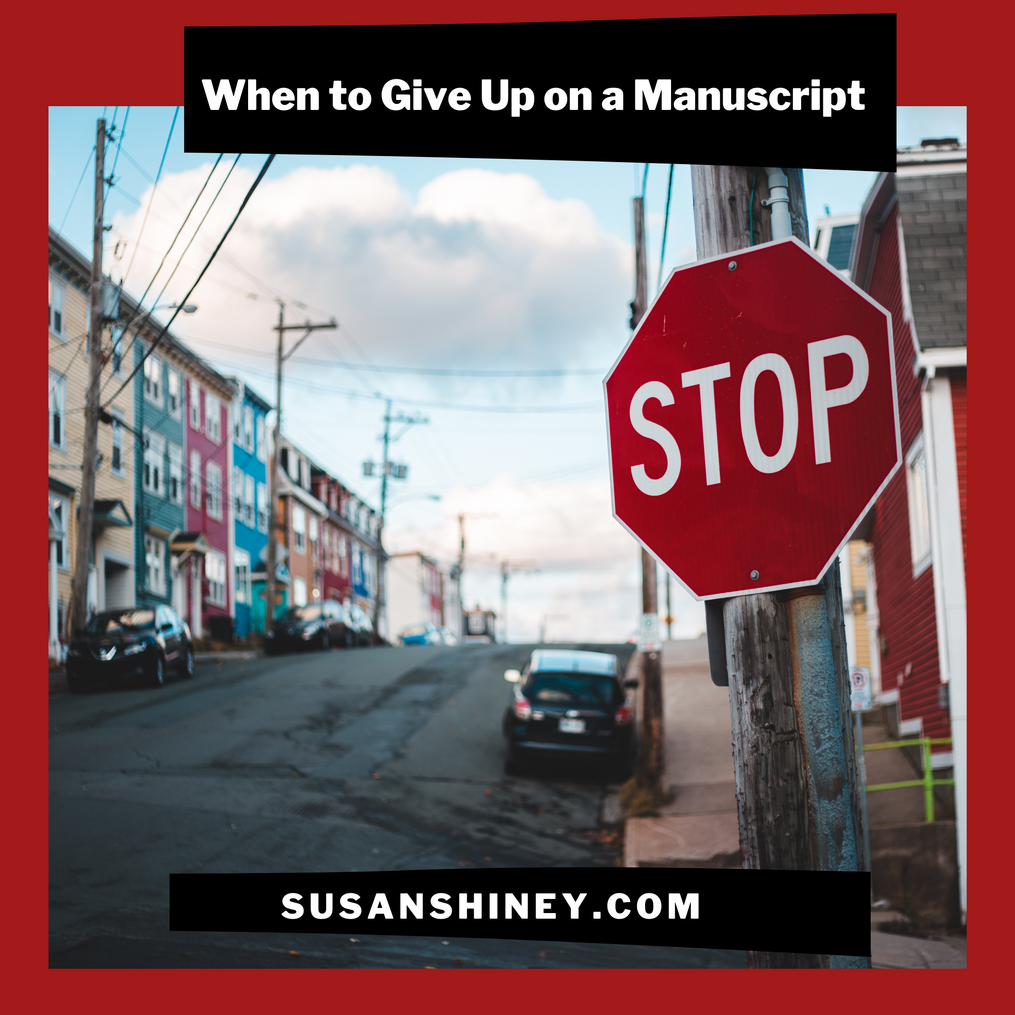
I wanted to write this blog about when to give up on a manuscript after making the difficult decision myself last month. I was working hard on applying to Author Mentor Match (AMM), which was an amazing experience that I got a lot out of, even though I ultimately decided not to apply.
Here is my blog post on the 10 Reasons to Apply to Author Mentor Match. It is a mini-querying experience where you are inundated with market information and critique partners to give each other feedback and help each other out with their applications. I was planning on being about six months away from totally finishing my book after years of working on it and ready to query it to literary agents.
While working on my query letter and synopsis for the first time, I came face to face with the market I was trying to sell to and how to condense my plot into a couple of paragraphs. On Episode 14 of my IG Live Writing Topics show with Author Ness Merceica, I broke the news that I had decided to abandon my novel.
I suppose I should also make it clear that I had been working on this particular manuscript for years and was at what I thought was the end point. In Anne R. Allen's blog post When It's Okay to Give up on a Writing Project, she mentions several valid reasons for giving up on a manuscript, such as being too emotionally close to the material and the timing of that book has come and gone. There are pieces of truth of each of these in mine as well. Times are always changing but with the new digital world we live in, the last ten years has seen exponential growth. My manuscript did not age well...
If you are near the beginning of your writing process and not sure if you should continue, I recommend 4 Signs It's Time to Quit A Writing Project by Maggie Doonan. She discusses craft related and process related issues to reflect on. I was happy with my process and what I have learned from writing from this first novel is invaluable, I do not feel as much of a sense of loss.
Here are some more elements that led to my decision:

Picture Credit: Joshua Coleman via Unsplash
1. Feedback from critique partners familiar with your genre and age group find major plot problems. (i.e. at least another year or two of changes that need to be fixed.)
I went through a round of critique partner feedback for my novel prior to doing the last couple of drafts as I geared up for querying. (Here is a blog post about how to implement and organize feedback for revisions.) However, they weren't young adult writers with their fingers on the pulse of that age group or my genre.
My original plan was for my novel to have a twenty year old protagonist that was mentally stuck in high school. The age group would make it more New Adult. In Alexa Donne's video New Adult is NOT a thing! (In Traditional Publishing) she describes why there isn't a market for it. Even, it I had decided to self-publish, which I don't want to at this point, most New Adult is romance oriented, not my focus at all. I guess it makes sense, college aged students are so busy focusing on their studies they don't have time to read during their leisure time. Thus the 18-24 year old dead zone for protagonists.
To compensate for this problem, I changed the age to a seventeen year old high school drop-out that skipped first grade, so that her peers were in college. I then wanted to make it a young adult book with very dark and adult themes.
As, I prepared for AMM and got feedback on my synopsis and query letter from other young adult writers, the major structural problems became evident. The Inciting Incident, the major questions for the query letter about the character's journey, all the elements of growth of the character, all of it was a problem.
I didn't give up right away. I spent time letting my mind try to find ways to solve the problems, of course it is always possible, but I wasn't willing to put any more time into it. Which brings us to the next point:

Picture Credit: Niklas Kicki via Unsplash
2. You aren't willing to put the necessary time in to make the changes you know need to be made.
For the last year I have been kicking up my marketing efforts and my awareness of the trends in traditional publishing as I prepared for querying. I have been learning. That is even more of a reason that when I got feedback that said my current WIP was not working, I knew they were right. It clicked.
It isn't just about making money, but ultimately this is a business venture. It didn't make sense to keep investing time into something that is so riddled with problems after years of trying to make it work and also learning the craft. It was the perfect idea to push me through the years it takes to learn, but not the one to be my debut novel.
In my efforts to learn more about publishing I have also been listening to authors talk about their writing careers and so many of them mentioned that they had to abandoned their first, if not several books because they didn't work for various reasons.
John Fox's article The Power Of Quitting : Why Every Writer Should Learn to Quit is a great treatise on giving up on stories. Part of my aha moment was knowing that New Adult stories don't have a place in the market years ago. I was such a newbie writer that I didn't even know how or when to quit. I told myself I was going to keep pushing through and ultimately I think I have wasted too much time on it. I have learned a valuable lesson and instead of feeling anchor less without this novel to latch on to, I feel empowered to know that wasn't the right direction, but I am that much closer to figuring out what is.
3. Your novel is problematic.
This element is hard to talk about, but I was inspired by Liselle Sambury's video about a novel she abandoned because it was ableist. Her advice is to go to sensitivity readers in the beginning to discuss your premise, which is an excellent idea.
I had several blind spots in my manuscript. Such as dealing with elements that required a lot of trigger warnings. It is fine to still write these kind of books, I just know for me, why would I want to take the chance of offending audiences and narrowing my market even more. Maybe if it was an idea I really believed in, but that was a part of my aha moment, I don't want to push these ideas out there, I don't believe in them enough. Especially when I wanted to write for a young adult audience, their is a responsibility for underage children, that authors have to pay attention to.
In addition to having ableist aspects in my third act, I had a gay character whose struggles with his family were a major part of the plot and that is not my story to tell. As well as suicide ideation as a theme of the book in line with a revenge and redemption arc. I wanted the overarching message to be of hope, but on the page it could be very damaging to certain readers. After the outcries against Thirteen Reasons Why, these are tropes that have been found to be damaging.
I should have checked in with sensitivity readers sooner about my premise. My intention would never be to hurt or offend anyone and I am sorry that I did not see the problems in what I was creating earlier. That is another reason why I have decided to abandon it and have been spending more time reading and educating myself about what ableism is, the importance of ownvoices and being aware of representation in fiction, and the harmful effects of suicide ideation in literature.
Again, a good lesson to be learned. Once some readers pointed these elements out to me, I decided not to go through with my application to AMM and I am glad I learned in time not to have my name connected with these ideas as I queried literary agents and possibly hurt people.

Picture Credit: Darius Basharvia Kyuhwgtmsi via Unsplash
4. You know the decision in your gut.
Yes, you don't want to be a quitter. I have to actively fight being the writer with five different manuscripts that they start and never finish. You need to work on keeping regular writing habits and pushing through draft after draft. But, you also need to have enough balance to take a step back and make sure you are going in the right direction. I lost my way, however it is totally possible for me to get on track again as a more informed writer.
After reading some harsh critiques of my synopsis and query letter and crying it out, I realized they were right and I was done.
Ali Luck in her article, When to Give Up on Your Writing Project... and When to Keep Going mentions the importance of not throwing everything away. I definitely won't. I have non-problematic elements that I can chop up for short stories, eventually, when I am willing to open it all up again.
I have also gotten right back on the horse and started outlining the ideas for my next book. Onward.
When should you give up on a manuscript? Have you ever abandoned a novel? Please leave a comment below.